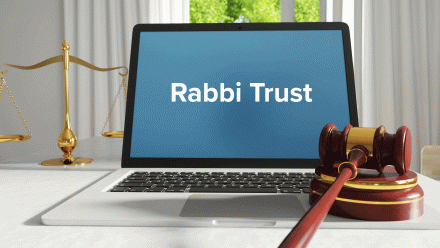A rabbi trust is a nonqualified deferred compensation arrangement.
It allows churches to set aside retirement funds for employees without immediate tax consequences for the employee.
Rabbi trusts are especially helpful for senior pastors nearing retirement, as they allow contributions that exceed the annual limits on traditional tax-sheltered annuities and qualified pension plans.
How Rabbi Trusts Work
According to IRS guidance:
- Contributions made by a church to a rabbi trust are not immediately taxable to the employee.
- To qualify, the trust’s assets must remain accessible to the church’s general creditors if the church becomes insolvent.
- This arrangement creates a “substantial risk of forfeiture,” preventing the employee from being considered in “constructive receipt” of the funds.
- As a result, taxation is deferred until the funds are actually distributed.
Case Study: Bank of America v. Moglia
The case of Bank of America v. Moglia, 330 F.3d 942 (7th Cir. 2003), highlights key legal considerations for rabbi trusts.
Case summary:
- Outboard Marine Corporation created a rabbi trust for an executive.
- After the company’s bankruptcy, a dispute arose over who was entitled to the trust’s assets.
- The court ruled that, according to the IRS Model Rabbi Trust Agreement:
- Trust assets were subject to the claims of general creditors.
- However, secured creditors could not claim those assets.
Key takeaway:
Precise trust language is crucial.
Church treasurers must carefully structure rabbi trusts to align with legal requirements and creditor rules.
(Source: Casetext)
Setting Up a Compliant Rabbi Trust
For churches considering a rabbi trust:
- Use the IRS Model Rabbi Trust Agreement:
Follow the structure provided in Revenue Procedure 92-64 to meet tax compliance standards. - Include creditor access provisions:
The trust must specify that assets are available to satisfy claims of general creditors in case of insolvency.
(Source: IRS)
Conclusion
Rabbi trusts can offer churches a powerful tool to provide enhanced retirement benefits to key employees, especially senior pastors.
However, it is essential to:
- Structure the trust carefully
- Use the proper legal language
- Understand the implications for both the church and the employee
For more detailed information, church treasurers should review:
- The IRS Model Rabbi Trust Agreement
- Case law examples, such as Bank of America v. Moglia
Proper planning and compliance can ensure that rabbi trusts provide the intended financial and tax benefits.

